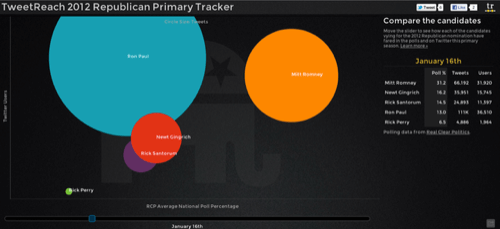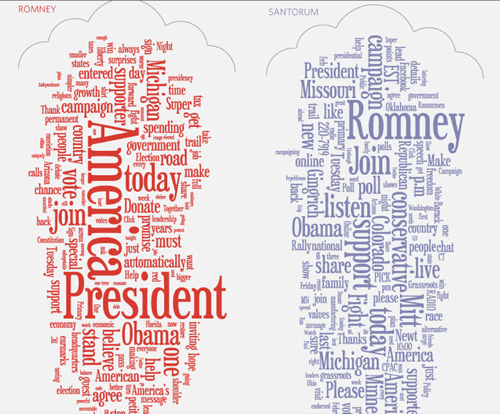We’ve been skeptical of social media’s ability to predict election results, but that hasn’t stopped a slew of social media experts spending the eve of Super Tuesday from rolling out predictions for Republican presidential primaries in nine states tomorrow.

The reason we’re skeptical is simple: social media is often echoing poll results, and in some cases amplifying those poll results. When social media has “predicted” the results of a primary with some accuracy, it has almost always been in line with what more scientific polls were predicting. In other words, social media hasn’t predicted any major upsets the polls hadn’t already seen and, in most of the primaries so far, the polls have been more accurate that the analysis of social media sentiment.
The best visualization of this comes from TweetReach, which has put together a Republican primary tracker. Using a slider, you can follow the number of Twitter mentions on a day-by-day basis from the start of the year through Sunday.
What you start to notice is that Ron Paul supporters tweet about the candidate a lot and allow him to stay prominent on social media while becomeing an also-ran in the race. Mitt Romney, meanwhile, has held steady while building on his status as front runner. Rick Santorum and New Gingrich, meanwhile have seen Twitter mentions spike after key victories, but they have yet to sustain any momentum on social media.
And what we need to take away from that is Twitter mentions do not make a president.

Above: TweetReach’s Republican candidate tracker showing Twitter mentions of candidates on January 16, when the Republican candidates debate in South Carolina.
Fizziology, meanwhile, released a report trying to dig a little deeper than social media mentions. The company uses social media sentiment analysis and also employs some real people to check samples of tweets to look for misspellings and sarcasm that computers may not pick up.
That’s great, but so far, Fizziology has struggled. In Florida, according to Mashable, the company said its social media sentiment analysis was showing “a much closer battle between Romeny and Gingrich” than polls were suggesting heading into the contest.
Romney, as we now know, trounced Gingrich by nearly 15 percentage points: hardly the squeaker social media experts had predicted.
That does not, of course, allow us to simply dismiss social media sentiment. All of the reports we read today, for example, show the number of candidate mentions going down as Romney comes closer to securing a nomination. And, as it does with picking stocks, social media helps us better understand polls and should be part of any predictive model this election year. Not to mention social media — and all the studies of what it is and isn’t telling us — is full of great information.
It’s also fun, in a wonky sort of way.
For example, we loved this infographic from socialbakers, not because it gave us any real insight into what will happen Tuesday in Alaska, Georgia, Kentucky, Massachusetts, North Dakota, Ohio, Oklahoma, Vermont and Virginia, but because of the words clouds about halfway down.
They are quite telling about what the candidates are thinking about when they post status updates on Facebook:
- Romney is fixated on the words President, America and, to a lesser extent, Obama.
- Santorum is fixated on Romney.
- Paul seems to do a lot of posting in the present tense: the most common word in his posts is “today.”
- Like Romney, Gingrich is most likely to use “President” and “Obama” in his posts, but his favorite verb is “get. ” He also likes the word “like.”

Above: Word clouds by socialbakers showing most frequently used words by Mitt Romney and Rick Santorum in Facebook status updates.










